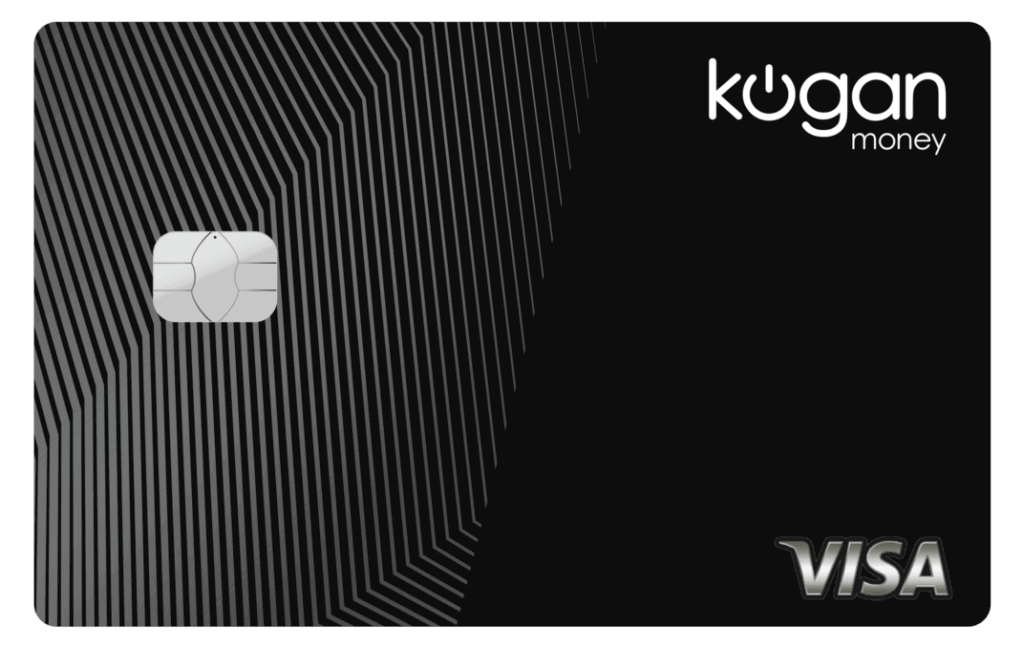No Annual Fee Credit Cards
*iSelect (through its wholly owned subsidiary, Tyrian Pty Ltd) and Fair Comparison Pty Ltd (which operates this credit product comparison) may receive a commission if users click through, apply, or successfully qualify, for a loan or credit card product from or through a provider.
Learn More

Kogan Money - Black Credit Card
- Default
- Longest Purchase Period
- Lowest Cash Advance Rate
- Longest Balance Transfer Period
Fair Comparison compares loan products from a range of banks and other financial or credit product providers and does not compare all products in the market or all product features. To filter the results, you will need to enter some basic information which will generate a comparison of products that fall within those parameters. The default ordering of products is based on initial purchase rate. Fair Comparison do not take into account your objectives, financial situation or needs, or provide advice, assistance or recommendations.
Learn MoreWhat are the pros and cons of a rewards credit card?
Some of the pros are:
- If you’re already a frequent shopper, you earn rewards for your spending habits.
- If you regularly shop at certain supermarkets or department stores, a rewards credit card could be a good way to benefit from bonus gifts and membership rewards.
Some of the cons are:
Rewards credit cards can come with high interest rates compared to other cards, so if you’re not on top of your repayments, you could land yourself into unwanted debt.
If you’re on a tight budget, this type of card might hinder rather than help your saving goals.
Are rewards credit cards worth it?
The good news is that if you’re generally financially diligent and you take care of your bills and repayments on time each month, a rewards credit card could be worth it for you.
Rewards credit card carriers generally earn one reward point per dollar spent, and can redeem these points on a range of merchandise, gift cards, entertainment, household items, technology, and even cashback.
But if making late repayments or missing them altogether is something you tend to do, then you might be penalised and end up making higher repayments than necessary. In these events, you could be charged at the purchase rate of your rewards credit card, which tends to be quite high.
Ultimately, when you start comparing rewards credit cards, make sure you’re interested in the specific rewards that are offered by the provider. Otherwise, you might end up earning points and getting rewards that don’t suit you or don’t match your expectations.
Keen to be rewarded?
If you’re ready to compare rewards credit cards, you can start here online with iSelect. See the range of providers and simply click on an option that suits you to begin your application.
Interested?
If you’re ready to compare no annual fee credit cards, you can start here online with iSelect. See the range of providers and simply click on an option that suits you to begin your application.
Interested?
If you’re ready to compare no annual fee credit cards, you can start here online with iSelect. See the range of providers and simply click on an option that suits you to begin your application.
If there’s no annual fee, what other fees are there to consider?
The table below shows the types of fees you should be aware of when comparing no annual fee credit cards:
| Purchase rate | - This is the interest that you’re charged on anything you buy with this card (after any interest free periods). |
| Cash advance rate | - This is the rate you’d be charged on any cash you withdraw from an ATM or retail checkout. |
| Balance transfer rate | - This is the rate you’re charged if you transfer an existing balance of funds to a balance transfer credit card. |
| Foreign exchange fee | - If you’re shopping online or buy something overseas, you might incur this fee on top of the exchange rate. |
| Foreign purchase fees | - There might also be extra fees to cover international processing costs. |
| Late payment fee | - If you miss a repayment, you might find yourself paying a late fee. |
| Payment dishonour fee | - If you try to make a repayment and fail due to lack of funds, you could also be charged for this. |
| Administrative fees | - There could also be monthly account fees to keep your card in use. |
| Paper statement fee | - Since most consumer communications have now shifted to email, some lenders may charge you if you choose to receive a printed balance statement by mail. |
| Payment handling fee | - Transaction fees could be either in person or online and vary between lenders. |
| Additional cards | - You might have to pay an extra fee if you request an additional card. |
| Limits on rewards points | - If there’s a rewards program, check to see if there’s a monthly limit. If there is, it’s possible that as you keep spending, you might not get as much back from your rewards program (compared with a credit card that offers limitless rewards points). |
Credit Card Providers
- About iSelect
- iSelect Services Guide
- Contact us
- How iSelect Works
- Our Company
- Careers
- Media Centre
- Become our Partner
- Sponsorships






